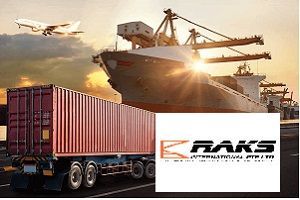
Definition of How to Do Logistics Services Work?
Any business or organization that transports goods or services needs to have a logistics division. Planning, carrying out, and controlling this process ensures that resources, information, and items are moved efficiently and effectively from the point of origin to the site of consumption.
The art and science of managing the movement of products and services from the point of production to the point of consumption are known as logistics. It entails coordinating a variety of tasks, including management of inventories, warehousing, packaging, and security, among others. The top logistics services Singapore are offered by Raks International. Accountability, responsibility, and sound judgment are values that Raks International upholds in everything they do. Let's expand on the logistical services.
Logistics - A Definition
Managing the flow of products and services from a source to a destination is the definition of logistics. It involves the organization, execution, and management of the movement of products as well as their storage and transportation. Along with monitoring inventory levels, tracking shipments, and collaborating with suppliers and consumers, logistics also involves handling information about the movement of commodities.
The Logistics' Mission
There are several essential domains where the course of logistics can fall:
Transportation:
Transferring goods between sites is a part of this. There are many methods to travel there, including by car, train, plane, and boat. The type of goods transported, the distance covered, and the related costs are only a few of the factors that affect the choice of transportation method.
Warehousing:
In this, commodities are stored before being transported to their final location. Raw resources, finished items, and goods in transit can all be stored in warehouses. Additionally, they are crucial in controlling inventory levels and guaranteeing that customers receive their orders on schedule.
Management Of Supply
To ensure that there is enough inventory to meet demand, inventory levels must be managed. However, not too much that it becomes a burden for the business. Monitoring stock levels, projecting demand, and placing orders as soon as possible are all necessary for efficient inventory management.
Managing the Distribution System
To accomplish this, actions across the whole supply chain must be coordinated, from the procurement of raw materials to the shipment of finished items to customers. It involves logistics, transportation, and the management of suppliers and the production process.
Management of Information
Information on the flow of commodities must be managed in this. As part of this, shipments are tracked and traced, inventory levels are managed, and suppliers and clients are contacted.
Packaging:
This involves selecting the best packing supplies and methods to guarantee the safe and secure transportation of goods. To make it easier to identify and track the commodities, it also requires tagging and marking them.
Security:
This means taking precautions against theft, loss, damage, and other occurrences while the goods and services are being handled, stored, or transported.
Since it directly affects customer happiness, operational effectiveness, and profitability, logistics is essential to the success of any company or organisation. An appropriately managed logistics system can aid a business in lowering transportation costs, increasing order fulfilment rates, and improving inventory accuracy.
Logistics Service's Function
For many businesses, logistics are crucial. Additionally, it is in use every day. Using logistics, a retail store, for instance, may make sure it has enough inventory on hand to meet demand while reducing the expense of storing that inventory. To make sure that products deliver to clients on schedule, an e-commerce company may use logistics. Managing inventory levels and working with suppliers is also important.
Final Words
Logistics is a complex, diverse subject that deals with the management of the flow of goods and services from the point of production to the point of consumption. It is a crucial element of any business or organisation that seeks to raise customer satisfaction, cut costs, and improve operational effectiveness. Companies with effective logistics management may gain a competitive advantage in the market and position themselves for long-term success. To hire the top marine goods forwarder in Singapore, feel free to contact Raks International.
Appreciate the creator